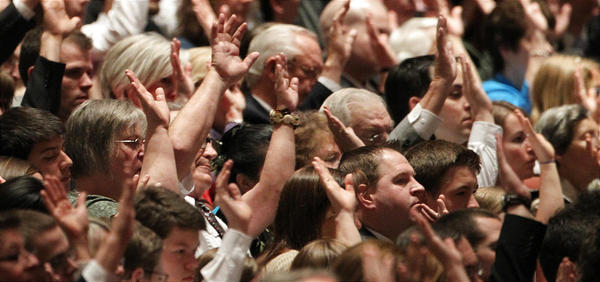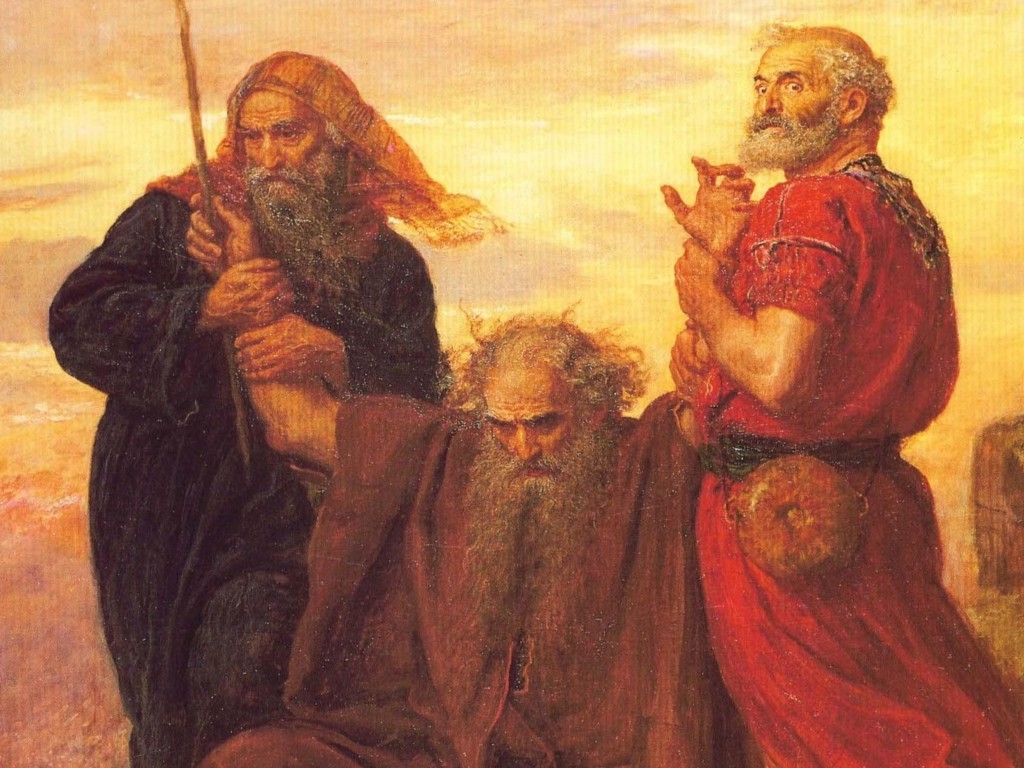We do a lot of sustaining in the church and by sustaining I am speaking in terms of raising an uplifted hand to indicate a vote of support for anyone called to a position in the church.
There is much more to sustaining than meets the eye and when we understand more about how this works.
Sustaining in church

“All of those in favor, please indicate by the uplifted hand.” says a member of the priesthood leadership on some Sabbath day morning, to which a congregation will usually raise their hands indicating their approval.
There is always a follow up question: “Any opposed by the same sign.” If you oppose the calling of someone to a position, you are asked to indicate it. You may address your concerns to leadership later.
This is a common occurrence, usually each Sabbath day, as new callings are announced and names are presented before the congregation due to government by common consent.
Joseph Smith once said: “No man can preside in this Church in any capacity without the consent of the people. The Lord has placed upon us the responsibility of sustaining by vote those who are called to various positions of responsibility. No man, should the people decide to the contrary, could preside over any body of Latter-day Saints in this Church, and yet it is not the right of the people to nominate, to choose, for that is the right of the priesthood.”
Smith, Doctrines of Salvation, 3:123
Elder Loren C. Dunn explained the responsibilities that accompany the sustaining process:
“When we sustain officers, we are given the opportunity of sustaining those whom the Lord has already called by revelation. . . . The Lord, then, gives us the opportunity to sustain the action of a divine calling and in effect express ourselves if for any reason we may feel otherwise. To sustain is to make the action binding on ourselves to support those people whom we have sustained. When a person goes through the sacred act of raising his arm to the square, he should remember, with soberness, that which he has done and commence to act in harmony with his sustaining vote both in public and in private.” (In Conference Report, Apr. 1972, p. 19)
The bigger picture of sustaining
I think that often we may just think that sustaining an individual means that we “approve” of them and that by raising our arms for a second or two, our duty stands fulfilled.
Let’s look at the definitions of the word “Sustain” for some further insight:
SUSTA’IN, v.t. [L. sustineo; sub and teneo, to hold under.]
- To bear; to uphold; to support; as, a foundation sustains the superstructure; pillars sustain an edifice; a beast sustains a load.
- To hold; to keep from falling; as, a rope sustains a weight.
- To support; to keep from sinking in despondence.
- To maintain; to keep alive; to support; to subsist; as provisions to sustain a family or an army.
- To support in any condition by aid; to assist or relieve.
- To bear; to endure without failing or yielding.
- To suffer; to bear; to undergo.
- To maintain; to support; not to dismiss or abate.
In consideration of the implications of some of these definitions, we are raising our hands to do much more than just voice an approval.
It is hardest to sustain an individual when we are aware of their human nature and imperfections, especially if we are aware of them as their names are offered for a sustaining vote.
It is our duty to raise our hands in opposition to the calling of an individual if we are aware of specific issues that may make them unfit for the calling.
As Joseph Smith said:
“I have no right to raise my hand in opposition to a man who is appointed to any position in this Church, simply because I may not like him, or because of some personal disagreement or feeling I may have, but only on the grounds that he is guilty of wrong doing, of transgression of the laws of the Church which would disqualify him for the position which he is called to hold.”
Smith, Doctrines of Salvation, 3:124.
But what if we really don’t like someone for some reason. Maybe the irritate us or we don’t like the way they talk, or we don’t agree with them politically. If there is no knowledge of any transgression on the part fo this person, consider Moroni’s words to us in our day concerning he and his father:
“Condemn me not because of mine imperfection, neither my father, because of his imperfection, neither them who have written before him; but rather give thanks unto God that he hath made manifest unto you our imperfections, that ye may learn to be more wise than we have been.” Mormon 9:31
He considers it a blessing from God to be able to see the imperfections of others, not for the purpose of condemning them, but for the purpose of learning wisdom from them. This is key, because it leads us to the next example from scripture that I believe is perhaps the greatest example of what it means to sustain one called of God.
Aaron and Hur; perfect models of sustaining
In a battle, Moses was to hold a rod above his head for as long as he could. If he did this, the armies of Israel would prevail, if he grew tired and his arms dropped the armies would begin to lose. Mind you, Moses is a very old man…
And Moses said unto Joshua, Choose us out men, and go out, fight with Amalek: to morrow I will stand on the top of the hill with the rod of God in mine hand. So Joshua did as Moses had said to him, and fought with Amalek: and Moses, Aaron, and Hur went up to the top of the hill. And it came to pass, when Moses held up his hand, that Israel prevailed: and when he let down his hand, Amalek prevailed. But Moses’ hands awere heavy; and they took a stone, and put it under him, and he sat thereon; and Aaron and Hur stayed up his hands, the one on the one side, and the other on the other side; and his hands were steady until the going down of the sun.
Exodus 17:9-12

Now note the reaction of Aaron and Hur. They could have said, “Wow, Moses is such a weak old man, why, there are many other men among us that could do the job better. I could even do better myself, why did God choose such a weak person for this job?”
They could have complained and murmured among themselves and allowed their murmuring to spread among the people, but they did not. They sustained Moses in the literal sense that we should sustain our leaders.
This is how I view the priesthood and church leadership. Do any of us understand the burdens they carry? Do we sit and look at Moses saying: “Look at him, he can’t even hold his hands up – he’s weak. Maybe he’s the wrong man for the job.” Or do we say “That’s the man God gave me to show me the way and I’ll stand by him and sustain him!”
Now I don’t think that in our day and time we need to physically prop up our leaders when they are weak, but then again…
I remember watching this conference and when I saw Elder Joseph B. Wirthlin losing control I felt uncomfortable for him and thought perhaps that they would ask him to sit down. I was thinking about how embarrassed and frustrated that he must have felt that his physical body couldn’t allow him to do something as simple as speak before a crowd.
Then, quietly, Elder Russell M. Nelson appears and holds up Elder Wirthlin for around five minutes while he dutifully finishes his talk with much difficulty. At the end of the video, you can hear Wirthlin utter a “Thank you” to his friend.
After witnessing this dramatic moment, I was immediately taken back in my mind to the story of Aaron and Hur and I understood the power of sustaining. In fact, implied in the word “sustain” by definition is the idea of being a foundation, to maintain, to hold, to keep from falling, etc.
Because we use the word “sustain” in reference to our leaders, the fact that they can fall is implied! Our duty is to not sit idly by, but realize that we may be needed to prop up an individual capable of falling or being shaken for our own benefit and the benefit of others in God’s kingdom.
Final thoughts
It isn’t just priesthood leaders that need our sustaining. There are parents, brothers, sisters, children, teachers, employers, employees and yes, even our elected representatives and other politicians. Sustaining is simply an appendage to one of the two great commandments; to love our neighbor as ourself. Too often we can be blinded by the position one holds and forget that they are a vulnerable, tortured soul like ourselves that need love and support to fulfill the duties of their office.
We err, if we assume that those in positions of authority must deliver perfection without help from us. We often expect the impossible, criticize them as they buckle under the weight of their calling and look to the next imperfect soul with high hopes.
God expects us to work with who we have as long as who we have is willing and worthy.


2 Comments
Probably not a huge deal, but sustaining has become conflated with performing ordinances. Nowhere doctrinally is it stated that we raise our arm to the square to sustain someone. It is more along he lines of raise your hand if you sustain this action being taken, to show consent.
Yeah, you are exactly right. There are similarities though and I think that is what people are seeing. I’ve never heard a person asking for a sustaining vote say, “All in favor, raise your ARM to the square.” They’ll usually say, “indicate with an uplifted HAND.”
Technically holding up a hand to indicate support or opposition isn’t an ordinance that involves ritual, however, you could argue that there is an aspect of covenant-making involved.
When you vote for something you are taking stance and pledging support. Maybe is less of a covenant with God and more of a pledge to receive and support on of his servants for our own benefit and the welfare of the collected saints.
So yeah, while there is a distinction to be made, there is a lot of gray in between. People will take positions at various points that tend more to one side than the other and while each may have their points, they’ve drifted so far to one side that they have excluded the influence of the other.
I think that in the test of life, God gave us various kinds of questions. Some are true/false, some are multiple choice, and others are open questions. The answers to the first two kinds of questions will always be a predictable limited number, while the answers to questions will vary per student. I think it is these kinds of questions that reveal the most about how we think, what our desires are, and what we understand.
If it was all just a clear set of rules, then life would just be about checking off boxes and there is some of that for order and boundaries, but there is much gray and I think it compels us to actually have to engage with thinking, scripture, revelation, etc. I see those things, and it’s helpful to me to have that perspective.